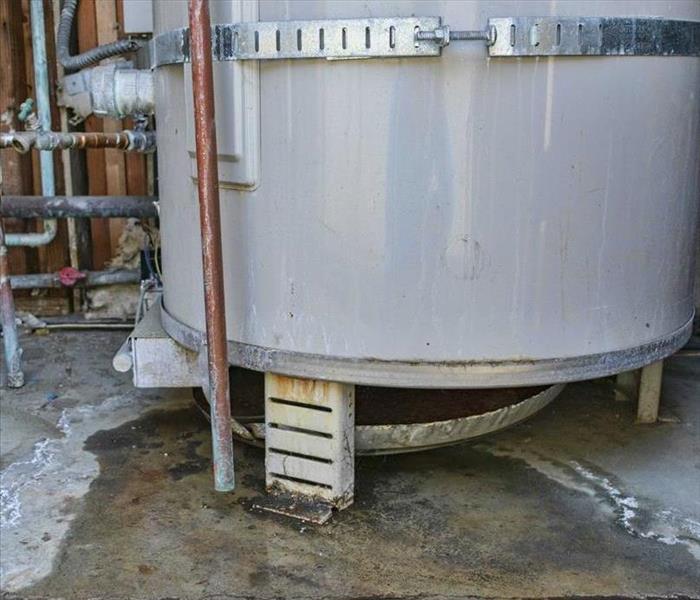Water Mitigation Procedures for a Leaking Water Heater
6/17/2022 (Permalink)
Homeowners often take their water heaters for granted until they stop working correctly. You may never think about how hard your appliance works each day to provide you with the essential hot water for taking showers, cleaning dishes, and washing clothes.
Unfortunately, sometimes there is nothing you can do to prevent a leaking water heater, but there are steps for mitigating the damage if it happens.
Steps To Take After a Failed Water Heater
1. Turn Off All Utilities
When you're experiencing a leak, it's best to shut off your water supply until you find the source of the leak and fix it. You can shut off your water at either your home's main valve or the valve that leads directly to the water heater. You should see two valves (i.e., for hot and cold water) beside the water heater.
If you have a gas-powered water heater, shut off your home's gas supply. Then, turn off the power to your home or the breaker for the water heater. Now, you can safely look for the leak and repair it.
2. Drain the Water Heater
If you have more than a tiny leak, it may be best to drain the water heater. Draining it will ensure that an influx of water doesn't occur, which could cause more damage to your home and contents. Draining the water heater is a simple procedure; connect a hose to the drain valve. This valve is located at the bottom of the appliance. The hose should allow the water to travel outdoors. Gravity will do the work of draining it once you loosen the drain valve.
3. Look for the Leak
There are several places from which your water heater may be leaking. Most of the time, water from a leaking water heater originates from the bottom of the appliance. Therefore, you may want to inspect that part first.
4. Remove All the Standing Water
Hopefully, you have a drain pan there to catch a leak and avoid water damage. However, if you discover standing water, it's essential to extract it as soon as possible. The easiest way to do this is to use a wet/dry vacuum. If the water has been sitting for a while, you may need to call water damage restoration professionals to inspect and repair the damage.
5. Remove the Excess Moisture
Next, it's time to remove the excess humidity from the air. Using a humidifier tends to work the best for this. You can also use heaters, fans and fresh air. If you see mold, avoid anything that will cause air to blow, as it can spread mold spores.
6. Inspect for Water Damage
Homes can sustain damage quickly with excess moisture, especially standing water. It's critical to inspect the entire area before and after cleaning and restoration.
If you discover that you have a leaking water heater in Ogden, UT, you will need to find the source and repair it as soon as possible. You'll also need to clean up the water immediately after stopping the leak. You can often prevent a broken water heater by regularly maintaining it.




 24/7 Emergency Service
24/7 Emergency Service
